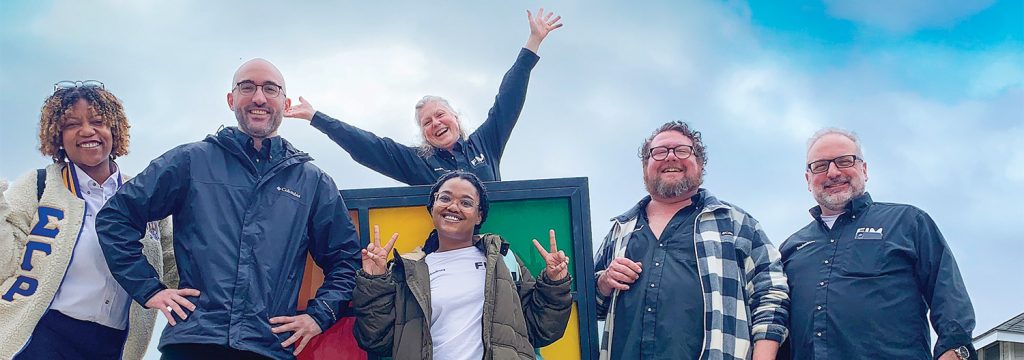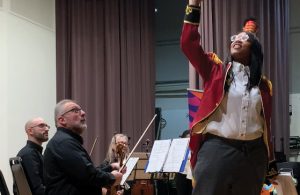FIM Troubadours Return To Classrooms With Learning and Laughter

Flint Symphony Orchestra (FSO) musician Lorrie Gunn always wanted to be part of the Troubadours, the traveling outreach ensemble comprised of FSO and other FIM performing artists. “I had an interview a few years ago and was not selected — yet,” says Gunn. When a Troubadours spot opened in 2024, Gunn became the newest member of the treasured and talented troupe.
But Gunn isn’t the only thing new about the Troubadours, a group conceived over 40 years ago as an extension of FSO. COVID-19 put a stop to live performances in 2020, but they made a triumphant return to the classroom in 2024, evolving to include new members, philosophies and artforms — with a goal to excite area students about performing arts and encourage them to participate.
Daniel Winnick, an FSO violinist, has been part of the Troubadours since 2017. He served as playwright for the 2023-24 production, curating both the story and live music excerpts that accompany it.
“When I became a Troubadour, I was joining a group with literally decades of experience creating shows for young audiences,” Winnick says. “We had access to a vast library of past programs that we would update for each new season. Working with longtime storyteller Sharon Boone and founding member Alesia Byrd Johnson to refresh these stories felt like a world-class apprenticeship in presenting programs that children could relate to — and hopefully, take inspiration from.”

In the current production, The Circus of Wonder, young audience members use their imaginations to visualize a circus performance before them. First-year Troubadour and storyteller Jimmela Byrd — who took the reins from 20-year Troubadour veteran, Sharon Boone, after her retirement — plays a ringmaster who guides the audience through the three rings of the imaginary circus: Music, Dance, and Theatre. With healthy doses of both silliness and structure, the substance of the show lies in its ability to illustrate just how fun performing arts can be.
“Performance just needs to show what creativity can do,” says Troubadours director Samuel Richardson, who worked closely with Winnick to write the script. “There is fun and enjoyment behind everything [the kids] are learning. And here we are presenting skilled professionals who have trained their whole lives to learn their art, but they still find ways to be silly with it; to laugh and have fun along the way.”
And it’s not just the youngsters Richardson hopes to impact through the Troubadours’ performances. “We forget to play as adults,” he says. “Kids laugh more in a day than we do in a month. There is more enjoyment than we realize in life. And we want them to hold onto it as long as they can.”
Winnick and Richardson weren’t the only ones in charge of finalizing a script for the group. “Above all, the show-creation process is collaborative,” says Winnick. “Everyone has a say in crafting the final version, and that ensures that the show we perform is the strongest it can be.”
 Gunn, who plays viola in the ensemble, has appreciated the opportunity to both collaborate and perform with the group of like-minded artists. “Everyone’s level of artistry is so high, it makes playing the show very enjoyable,” she says.
Gunn, who plays viola in the ensemble, has appreciated the opportunity to both collaborate and perform with the group of like-minded artists. “Everyone’s level of artistry is so high, it makes playing the show very enjoyable,” she says.
The chemistry between the group is palpable among their student audiences and the end result — always a mix of surprise and delight — is reciprocal.
“There’s no substitute for live performance,” says Winnick. “We feed off the energy of the students at our shows, and we are able to connect with them in ways large and small that give a resonance to the experience.”
Coming out of the pandemic, virtual programming allowed the Troubadours to reach a broader audience — a single video link can reach thousands of students simultaneously. In contrast the group visited 23 schools in three months during Spring 2024. Winnick still has no doubt that a return to schools makes for much more meaningful exchange. “We want to meet students where they are, in every way, and to do that, it’s important to be physically present,” he says.
According to Richardson, meeting kids where they are also means engaging a variety of learning styles. “There are multiple ways to learn, and we’re just showing a few different avenues,” he says. “Some kids will learn by coming up to the stage and doing, others will learn by watching and others by listening. And all of them are looking for fun.”
Winnick also admits that the creative challenge presented by virtual programming was not without its benefits. For example, it allowed for experimentation like incorporating footage of dancers and vocalists into recordings. Now in-person, the group has added a talented dancer to the ensemble, which Winnick says adds a “whole new dimension” to performances.
“It’s awe-inspiring to see [the kids’] eyes light up,” says dancer Aiesha Lewis, who also works as community programs coordinator for FIM. “This is a unique opportunity to teach and perform while inspiring the kids to try something new.”
As an African American woman, Lewis is proud to broaden perspectives about what it means to be a classically trained dancer. “It’s interesting to be in classrooms where there are kids who look like me and have never seen anyone that looks like them perform this kind of dance,” says Lewis, who performs mariachi and ballet during the show. “I have the knowledge and ability to teach kids how diverse dance is, and that you can do any genre no matter what you look like.”
All members of the Troubadours — including Bill Milicevic, violin, and Brandon Cota, cello — agree that reactions like those Lewis describes are exactly why the Troubadours have survived the tests of time, including a global pandemic.
“The Troubadours are a near-legendary presence in Flint,” Winnick says. “Our mission is to inspire children to explore the arts, the world around them and the potential within themselves. I can’t imagine a more worthy calling as an artist, and I think all of us feel the
same way.”
If you or someone you know is interested in having the Troubadours visit a school,
please contact Aiesha Lewis at alewis@thefim.org.